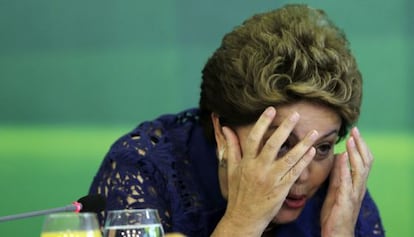Rousseff forces out Petrobras leaders
Brazilian president seeks to contain fallout from corruption scandal at state oil company

Brazilian President Dilma Rousseff has decided to settle one of her battles by accepting the resignation of Petrobras president Graça Foster.
The state-owned oil firm, which is the largest company in Latin America, has been undermined by a corruption scandal that has seen it lose nearly two thirds of its value over the course of four years.
Foster had said she would remain at her post as long as the president continued to trust her. And Rousseff had always supported her – until Wednesday, that was. Foster’s departure and that of five directors general is expected to take place on Friday.
In 2010 the company was worth 380.2 billion reales. Four years later, its value has more than halved
Even before A Folha de São Paulo confirmed the rumors about Foster’s imminent resignation in its digital edition on Wednesday, the price of Petrobras shares had already risen 15 percent, and the confirmation nudged the price up a further four percent.
President Rousseff had defended Foster during a press conference in Brasilia in late 2014, saying that she was a friend and that she had no intention of replacing her: “I know her and I attest to her seriousness and correctness.”
Last week’s news reports saying that corruption schemes and inefficient projects had stripped the company of 88 billion reales (about €28.6 billion) played a role in the executive’s decision. Foster was not only the head of a gigantic flailing company, she was also the president’s political shield.
In 2010 the company was worth 380.2 billion reales. Four years later, its value has more than halved and now stands at 112 billion reales (€36 billion), the result of poor investment choices and reports of corruption. Although Petrobras still makes money, a report published on Wednesday said its earnings fell by 9.07 percent in the third quarter of 2014 compared to the same period in 2013, without accounting for misappropriated funds.
Meanwhile, 18 more people will have to testify in connection with the scandal as Operation Carwash continues to unfold. One of them is João Vaccari Neto, treasurer for the ruling Workers’ Party (PT), who is suspected of playing a key role in the bribes-for-contracts scheme.
And revelations continue to surface. On Wednesday, Julio Camargo, one of the businessmen accused of bribing executives at Petrobras, admitted to paying 12 million reales (nearly €4 million) to secure contracts, and said that bribes from construction companies were “an institutional reality” within Petrobras.
Translation: Dyane Jean François
Tu suscripción se está usando en otro dispositivo
¿Quieres añadir otro usuario a tu suscripción?
Si continúas leyendo en este dispositivo, no se podrá leer en el otro.
FlechaTu suscripción se está usando en otro dispositivo y solo puedes acceder a EL PAÍS desde un dispositivo a la vez.
Si quieres compartir tu cuenta, cambia tu suscripción a la modalidad Premium, así podrás añadir otro usuario. Cada uno accederá con su propia cuenta de email, lo que os permitirá personalizar vuestra experiencia en EL PAÍS.
¿Tienes una suscripción de empresa? Accede aquí para contratar más cuentas.
En el caso de no saber quién está usando tu cuenta, te recomendamos cambiar tu contraseña aquí.
Si decides continuar compartiendo tu cuenta, este mensaje se mostrará en tu dispositivo y en el de la otra persona que está usando tu cuenta de forma indefinida, afectando a tu experiencia de lectura. Puedes consultar aquí los términos y condiciones de la suscripción digital.








































